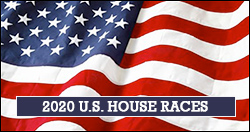By Jim Ellis

Michigan Rep. Justin Amash
Rep. Amash has served his whole career as a Republican, being first elected in an open congressional seat back in 2010 after winning a state House district in 2008. Though he left the GOP, he did not affiliate with the Libertarian Party, which many expected. Still, he has the option of running for that party’s presidential nomination even if he does not serve in Congress as a Libertarian.
But Amash’s decision clearly changes the congressional race. If he ultimately decides to seek re-election, his decision to leave the GOP is somewhat curious, at least from an electoral perspective. At this point, already four Republicans have announced, with at least three of them clearly credible. Two are sitting state representatives and one an heir to the Meijer retail store chain that features more than 200 stores predominantly in the Midwest. With no run-off required under Michigan election law, a large competitive field would have played to Rep. Amash’s favor since the contest would have been a base vote nomination election.
Should he decide to seek re-election as an Independent, then all bets might be off. Under the same premise that a crowded field could have helped Amash win a Republican primary, at least a three-way general election candidate field could conceivably allow him to win re-election in similar plurality fashion. But, either major party candidate might have the same advantage making this a wild card race.
Additionally, the three-way set-up could put what is typically a reliable Republican seat in play for the Democrats. Should Amash and the eventual Republican split the right-of-center base, it is conceivable that the Democratic nominee could find him or herself in position to score the plurality victory.

 July 3, 2019 — If you thought the 2020 cycle might feature a smaller number of primary challenge campaigns than we’ve seen in recent election years, then Monday might have changed your opinion. No less than six combined intra-party incumbent opposition campaigns were announced, or at least publicly contemplated.
July 3, 2019 — If you thought the 2020 cycle might feature a smaller number of primary challenge campaigns than we’ve seen in recent election years, then Monday might have changed your opinion. No less than six combined intra-party incumbent opposition campaigns were announced, or at least publicly contemplated.
 April 19, 2019 — The Federal Election Commission reports are now in the public domain for first quarter 2019, and the amount of money being raised early suggests we could be headed for another record spending year in the 2020 campaigns.
April 19, 2019 — The Federal Election Commission reports are now in the public domain for first quarter 2019, and the amount of money being raised early suggests we could be headed for another record spending year in the 2020 campaigns.